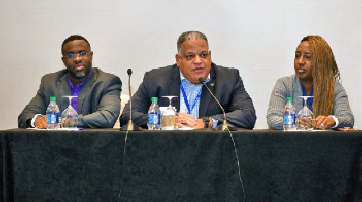St. Kitts Government to tighten up on expenditure in 2011
BASSETERRE, St. Kitts – St. Kitts and Nevis Prime Minister and Minister of Finance Hon. Dr. Denzil L. Douglas says the effects of the global economic downturn are expected to persist in 2011 and that revenue intake is expected to be negatively impacted in a manner similar to that experienced this year.
He told Tuesday’s Budget Session of the St. Kitts and Nevis National Assembly that there will be significant curtailment in the recurrent and capital expenditure for the 2011 and “although some reductions have been made in some programmes, Government has been careful to ensure that critical Ministries such as National Security, Health and Education were adequately resourced so that there would be no decrease in the level or quality of service.”
Dr. Douglas said that the recurrent revenue for 2011 has been estimated at EC$432.9 million while recurrent expenditure had been pegged at EC$401.3 million.
The global recession, he said has forced countries all over the world to tighten their fiscal stances and strengthen public finances to reduce the risk of crises.
“Our economy has demonstrated great resilience over the years, but we simply could not put the many achievements of our people at risk by sitting idly as the great recession, one of the worst crises for over a century, devastates economies all over the world and threatens our stability.
“We had to demonstrate the leadership and common sense that has characterized our period in office, and act definitively and pre-emptively to maintain the macroeconomic and fiscal stability of our beloved Federation.”
Dr. Douglas said the Government’s efforts to prioritize Capital Expenditure will be intensified in 2011 to concentrate on those projects which will foster economic growth.
He said that a much more realistic capital budget for 2011 has been prepared in line the funding capability and there are some critical projects that must be implemented in 2011 if the transformation process is to be advanced.
“We must repair and rehabilitate the South East Peninsula Road during 2011 if we are to provide convenience and safety to our people who use that road and facilitate the establishment of the South East Peninsula as a major center of growth over the medium-term. This project, which will cost in the region of $12 million, will help to ensure that the South East Peninsula, with its abundance of exquisite natural attributes, realize its full potential to become one of the leading destinations in the world for high-end tourists and villa owners pursuing luxurious lifestyles,” Dr. Douglas told legislators and the nation.
He spoke of his St. Kitts-Nevis Labour Government’s aim to achieve a Primary Balance Surplus of at least 5.8% of GDP and the measures outlined will go a long way in achieving this target.
The Prime Minister also announced that his administration would be tightening up on expenditure in the new fiscal year and as a result would be placing strict caps on expenditure heads such as allowances and overtime.
The Ministry of Finance has determined that these measures may prove insufficient to achieve the desired level of fiscal consolidation. Therefore, we will also introduce the following expenditure measures in 2011.
He said strict caps will be placed on expenditure heads such as Allowances and Overtime. “This means that each Department will be given a limit for expenditure on these expenditure items and they will not be allowed to exceed the assigned limit. We will rationalize study leave and the expenditure that this entails as well as the University of the West Indies (UWI) Economic Cost and contributions to regional and international organizations in line with what we can afford and in keeping with the priorities that Government has established in respect of the skills and resources required to advance the development process,” said Dr. Douglas, disclosing that the process will begin to remove subsidies such as that which is in place for liquid petroleum gas and of setting up a Government-wide system to monitor the use of Government’s assets such as vehicles and heavy equipment, with a view to reducing maintenance, operating and fuel costs.
“Mr. Speaker, there are certain activities in which Government is involved which can be effectively undertaken by the Private Sector under proper regulation. The Supply Office function is one such activity that we intend to relinquish to the Private Sector with targeted social safety nets to ensure that the vulnerable in our society will still be able to afford these basic necessities. Moreover, we will accelerate the pace at which Government moves forward with the privatization of entities engaged in commercial activities and previously identified for commercialization and privatization,” the Prime Minister outlined in his 54-page Budget Address.
He said that the rationalization of the Civil Service through job evaluations will also be tackled in 2011 and will include the identification and elimination of excess staffing as well as ensuring that full-time salaries are paid only for full-time work.
“We will also review the operations of the Centralized Purchasing Unit (CPU) to ensure that we are receiving value for money through centralized purchasing of equipment and supplies. In this connection, technical assistance will be sought to provide the necessary advice for the restructuring of the CPU to enhance efficiency and effectiveness and to deal with the issues of Government’s payment of the VAT. We have estimated that these additional measures will save approximately $7 million,” said the Prime Minister and Minister of Finance.
On the revenue side, there will be a 30 % increase in the Excise Tax on cigarettes and increase several of the fees which are charge for services provided by Government. These include Visa Fees and certain Licence Fees which do not cover the administrative cost of providing the relevant services.

